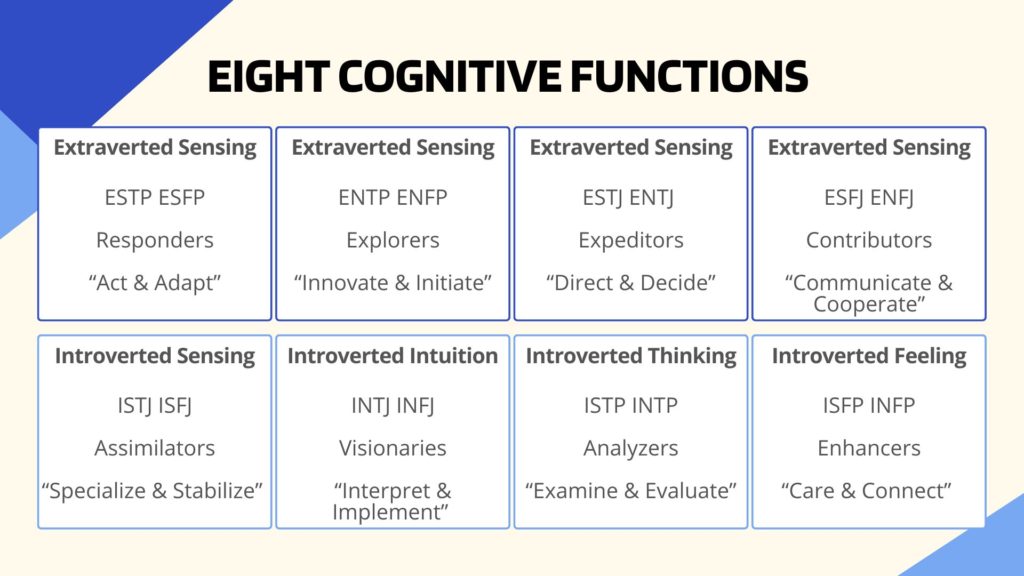The 16 MBTI types can be simplified into 8 Cognitive Functions
Important to remember:
- Everyone uses all 8 functions
- Our type determines our ability to use each function
- 2 will serve as our strengths
- 2 will serve as our weakness or blind spots
- The remaining 4 are our “Shadow Functions”, in our unconscious. Often displayed during stress
- All functions are equally valuable
The Eight Cognitive Functions
- Extraverted Sensing (SE)
- Introverted Sensing (SI)
- Extraverted Intuition (NE)
- Introverted Intuition (NI)
- Extraverted Thinking (TE)
- Introverted Thinking (TI)
- Extraverted Feeling (FE)
- Introverted Feeling (FI)
The Dominant Function
4 of the Cognitive Functions are based on “Perception”, how we take in information (S or N) The other 4 are based on “Judging”, how we make decisions (T or F)
Everyone has one favorite function among the four mental functions (S, N, T or F). Everyone uses that favorite function in their favorite (Extraverted or Introverted) world. This is what determines our Dominant Function.
- Also referred to as our Hero/ Heroine Role
- It is our default function when called to “Save the Day”
- Our natural strength
- How we are “Hard-Wired”
- Our strongest function, usually well developed by age 13
- Often the only function developed at this age.
The Auxiliary Function
We each also have an Auxiliary Function. This is our 2nd strongest function. It is also referred to as our Supportive Parent Role because we use it in a positive, helpful, and supportive way.
It is also usually the one we start with when lending help and support to others.
90% of our personality is made of these two functions: our Dominant & Auxiliary

MICHELE BURCH REID, MS FOUNDER OF LCI
More From Michele
Mindfulness & Bullfrog Moments
The other day I was working with a client, and she was sharing with me how a bullfrog appeared on her porch. She was laughing about how she had lost all track of time and the next thing she knew, she had been watching the bullfrog for 45 minutes. Those are the perfect...
Personality Type, MBTI & Carl Jung
MBTI is based on the theories of Carl Jung, the father of Personality Type Carl Jung’s perspective on personality is quite insightful; he wrote that what appears to be random behavior is actually the result of differences in the way people prefer to use their mental...
Personality Type in Conflict
Personality Type in Conflict After 30 years of studying personality type in relation to conflict, Damian Killen & Danica Murphy have developed a model instrumental in identifying how a person's personality type influences their behavior during conflict. I have...






